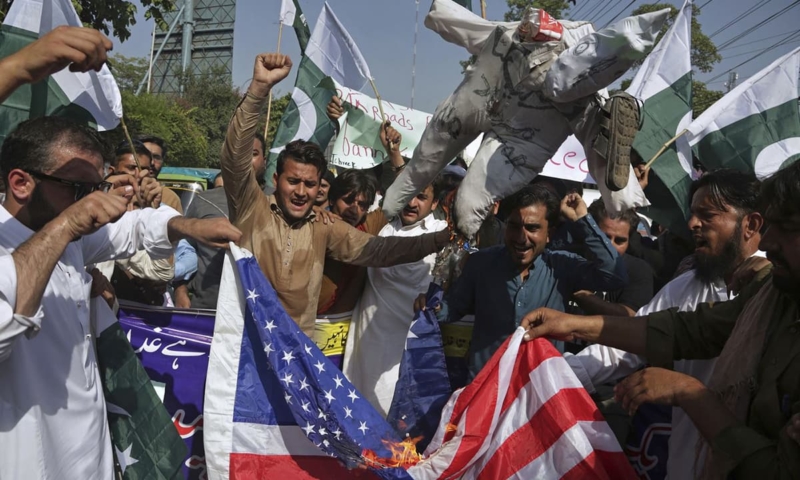By Raza Rumi :
Six months ago, an extraordinary news report was published by Dawn, which recounted the contents of a military briefing given to journalists on November 30, 2010. A top Pakistani military official stated that Pakistan “has transited from the ‘most sanctioned ally’ to the ‘most bullied ally'” of the US. Essentially an off-the-record briefing, the contents were leaked to the public wherein the army leadership declared that the US had a ‘transactional’ relationship with Pakistan. That the US was “interested in perpetuating a state of ‘controlled chaos’ in Pakistan”; and the “real aim of US strategy is to denuclearise Pakistan”.
Paranoia about the US runs deep into the Pakistani psyche now. Other than the reticent generals, it is the vocal media men who have now made anti-Americanism an article of faith of Pakistani patriotism.
The recently published WikiLeaks cable of May 2008 reveals that many of Pakistan’s National Defence University (NDU) students and instructors ‘have an anti-American bias’. In the cable, former US ambassador Anne Patterson reported on US Army Colonel Michael Schleicher’s study period at the NDU, where he attended the Senior Course along with 110 Pakistani officers. Schleicher estimated that a third of the class was religiously devout, a third moderate and less than a third overtly secular. He also said that pedagogy at the NDU represented misperceptions about US policy and culture. A guest speaker (a general) held that “the US National Security Agency actively trains correspondents for media organisations”.
At the time this cable was released in Pakistan, Pakistan’s ambassador to the US, Husain Haqqani, also lectured at the NDU, where he tried to argue that it is “perfectly possible for two nations to have an alliance but not have a total convergence of interests. For example, just as Pakistan’s views about India are not shared by the US, America’s views about Iran are not shared by Pakistan.”
After a long spiel on reasoned view of foreign policy, Haqqani asks, “What is the principal national security threat to Pakistan?” The audience is invited to vote by raising hands for categories, ‘from within’, ‘from India’ and ‘from the US’. Not surprisingly, a majority of hands were raised for the US.
Perhaps the best summation of the syndrome comes in Haqqani’s own words: “If [the biggest threat to Pakistan’s security] really comes from the US, then we’ve already lost, ladies and gentlemen, because you can’t beat the US in a military confrontation and that is the reality which we have to accept, whatever our emotions. Because, let us be honest, we do not have the means to take on the one military power in the world that spends more on defence technology than the next 20 nations in the world. So, that is where I think we sometimes end up having what I call ’emotional discussion’. I see it on Pakistani television all the time.”
A calm Haqqani tries to reason with martial minds: “How can we be integrated into the global economy if we are not part of the international economic system which, right now, whether we like it or not, is led by a single country. A reality based foreign policy for Pakistan will have to integrate [Pakistan] into the global economy. [The policy] will have to take into account Pakistan’s concerns emanating from the terrorist threat within the country.”
Perhaps this is where the greatest of our challenges resides. The enemy is somewhere within, deep into the Pakistani psyche – an inheritor of the ‘invasion-threat’. In a century that defines power in terms of economic and technological advantages, our national ideology leads us to somewhat simplistic thinking. We still only celebrate Turko-Afghan Muslim invaders of the subcontinent and resent the arrival of the European colonialist in the garb of traders. But the world has moved beyond Ghauri and Lord Clive. The religion-based ideology designed to forge national unity might end up being our undoing, coupled with an unwillingness to embrace the realities of the contemporary world. In any case, how can we explain how an institution continues to be the largest recipient of US assistance and its ally for decades; and apparently resents it too?
Published in The Express Tribune, June 4th, 2011.
Source: http://tribune.com.pk/story/181759/is-america-really-our-enemy-no-1/



